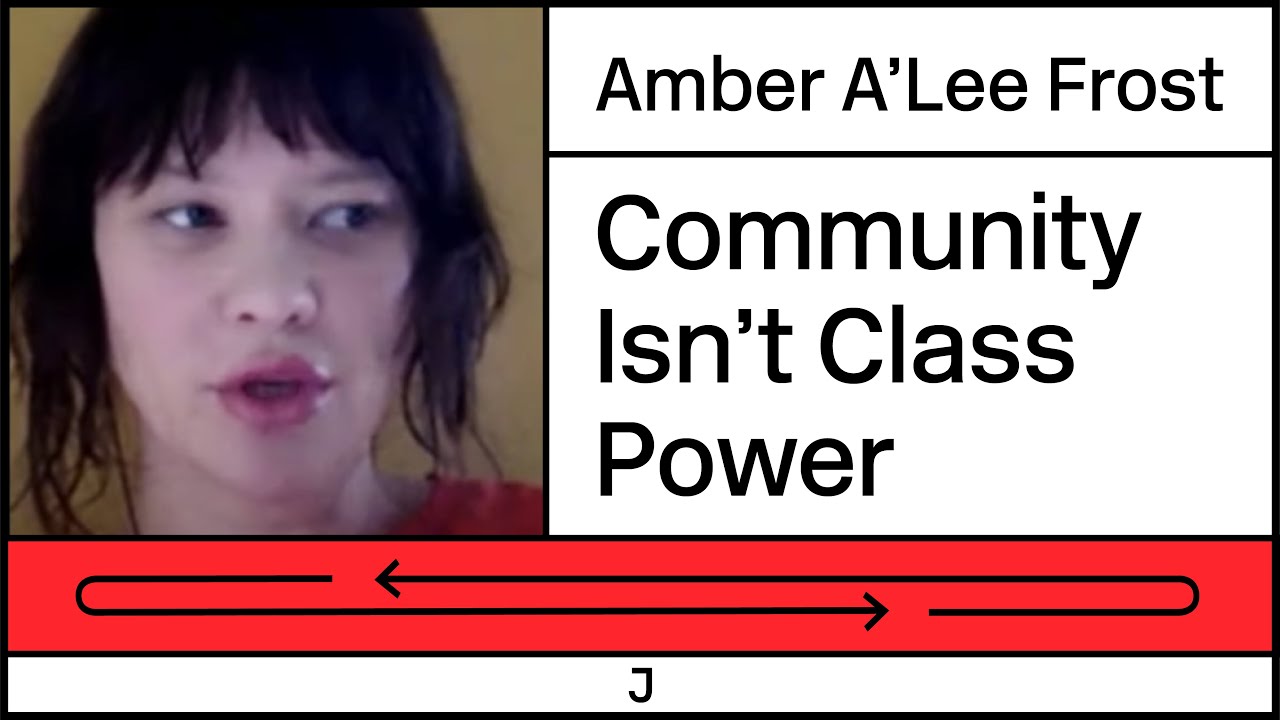Listened to this a few days ago. Here are some of the points I remember that seem like good additions to the conversation about how we can build socialism.
- Mutual aid is good, but not everything that's good is socialism.
- The goal of socialism is not to more equitably redistribute what little wealth workers currently control; the goal of socialism is for workers to own the means of production.
- There are clear limits on what mutual aid can do -- there's a line to the effect of "I can't make insulin in my bathtub." This limits how effective mutual aid can be as part of any dual power theory and limits how effective it can be as training to take control of the means of production. For instance, mutual aid will never be able to match the size and complexity of a federal program.
- People are smart enough to figure out what you're doing if your leftist organization plans on using mutual aid as a recruitment tool (and this is true even if you don't condition your efforts on listening to a speech or something). This can easily backfire and cause resentment.
- Socialist ideas are good enough to stand on their own. You can convince people that socialism is good even if you're not giving them a meal.
- Many mutual aid projects envision creating a community atmosphere, but a lot of people already have communities. They may appreciate the help but not want to get further involved.
All of these are at least worth considering. One criticism is that mutual aid potentially can help with de-stigmatizing socialism, which is a prerequisite to building socialism. It's harder to get people on board with socialism in an environment where socialism is equated with horrible scary foreign governments than it is in an environment where socialists are real people you know who do good things in your city.
Socialist ideas are good enough to stand on their own. You can convince people that socialism is good even if you’re not giving them a meal.
Real liberal "marketplace of ideas" bs there from the Brooklyn podcaster.
:geordi-no: Improving people material conditions in order to build a large coalition.
:geordi-yes: Bring people in via twitter shit talk and the marketplace of ideas.
A person's material conditions prime them to agree with certain politics, but material conditions do not determine that person's politics. Look no further than the tens of millions of Americans who've had their pockets picked by capitalists their entire lives but who are Republicans to the bone.
We absolutely need to put in the work of convincing people to become socialists, and yeah, that involves talking politics with them. A free meal isn't going to turn them into a socialist any more than stimulus checks turned people into Trump supporters.
Look no further than the tens of millions of Americans who’ve had their pockets picked by capitalists their entire lives but who are Republicans to the bone.
Because what other option have they had? Most these people lost their jobs via NAFTA style trade deals that the Dems love. They were abandoned for cheaper overseas labor and resent Dems for that.
We absolutely need to put in the work of convincing people to become socialists, and yeah, that involves talking politics with them.
Ok? And people are going to be more willing to listen to someone who's proven themselves willing to help then instead of some dickhead they don't know yelling about capitalist constrictions online.
A free meal isn’t going to turn them into a socialist any more than stimulus checks turned people into Trump supporters.
I mean this genuinely, have you done any in person discussion with people? I don't want to sound rude but people are much more inclined to take the point of view of someone they know and trust. So helping people survive is going to build trust which you can then build upon. How can you expect to convince people of your point of view if you set up in opposition to them?
NAFTA had bipartisan support, so it's not as simple as "Democrats did this and people hated it." Blaming NAFTA solely on Democrats (when negotiations started under Reagan and Republican congresspeople made up most of the votes to ratify it) is actually a great example of how political messaging can work independently from material reality.
people are going to be more willing to listen to someone who’s proven themselves willing to help then instead of some dickhead they don’t know... people are much more inclined to take the point of view of someone they know and trust
People get a lot of their politics from people they have no personal connection to, and who have shown little-to-no willingness to help them. The whole pundit class and most politicians fit this description. Besides, serving someone a meal does not mean they know or trust you, and people frequently dismiss the political opinions of people they know and trust in other contexts (think family members).
whole pundit class and most politicians fit this description
I think you're highly underestimating people parasocial relations with celebrities/people on their tv.
Agreed that it does, but it's not just propaganda; ideology is all encompassing and more pervasive than propaganda alone, and can justify things that would contradict one's material interests by seeming real and reflecting the everyday experience.
I agree that you'll be able to get some people through the marketplace of ideas. But, you build much bigger, lasting, and more diverse groups through actual mutual aid.
Also, those people will be willing to actually go out and put in work (imo) as opposed to others who might like things in theory, but then never be willing to take action.
Pros and cons to each approach, room for both, no need to malign the proponents of either one.
Most of those points I’d agree with except the following:
People are smart enough to figure out what you’re doing if your leftist organization plans on using mutual aid as a recruitment tool (and this is true even if you don’t condition your efforts on listening to a speech or something). This can easily backfire and cause resentment.
This makes it sound like mutual aid as a recruitment tool is something nefarious which is nonsense. So what if people know it’s partially to help recruitment and spread a message? I don’t agree at all there is “backfire” potential here.
I help run a mutual aid org. The most radical thing to people when they encounter us is that we don't means test. That alone is a crazy idea for people to find in a neolib hellscape.
We're trying to start some political education stuff, I'm not sure how that will go, but we'll see. Even if it's not going to bring about socialism over night, organizing feels good and gets me involved in real ways offline.
The most radical thing to people when they encounter us is that we don’t means test.
Using mutual aid as a proof-of-concept definitely has some potential.
You can't make insulin in a bathtub, but a federation of bottom-up organized groups of chemists and workers can. You don't need federal programs for that.
Although having a federation sounds cool, haven't these kinds of structures proven to be inefficient and easily destroyed in the past?
the goal of socialism is for workers to own the means of production.
The goal of socialism is workers becoming the dominant class, abolishing commodity production, abolishing class distinction and doing production according to need and ability. Still, the biggest issue here with Amber's position is her presentation of socialism is just doing New Deal era labor movement but "more", when that movement ended up failing.
I think point 5 amber presented well enough, but it's not "socialist ideas". Organize people to their immediate interests and what they need (tenant organizing, labor organizing),. Otherwise we're just doing advocacy and charity work.
Love the conversation that's come out of this and I think it's really valuable. It's definitely true that we can't make insulin in bathtubs - we need social change on a level that's higher than just basic community service. But that doesn't mean we need to toss out mutual aid as worthless. The more you divorce material conditions from the control of the state, the more viable revolutionary action becomes. It's a hell of a thing to tell a person they need to go on strike despite knowing that without wages soon their family will starve. It's another thing entirely to tell them "go on strike and you and your family will be fed, clothed, and housed no matter what happens." Mutual aid is more than outreach. It's the creation of non-state material support systems that can be tapped during times of resistance.
Can't say it better than the man himself :kropotkin-shining:
spoiler
A Government, composed of men more or less honest, was formed and undertook to organize — the Republic in 1793, Labour in 1848, and the Free Commune in 1871. Imbued with Jacobin ideas, this Government occupied itself first of all with political questions, such as the reorganization of the machinery of government, the purifying of the administration, the separation of Church and State, civic liberty, and such matters. It is true the workmen’s clubs kept an eye on the members of the new Government, and often imposed their ideas on them. But even in these clubs, whether the leaders belonged to the middle or to the working classes, it was always middle-class ideas which prevailed. They discussed various political questions at great length, but forgot to discuss the question of bread. Great ideas sprang up at such times, ideas that have moved the world; words were spoken which still stir our hearts, at the interval of a century. But the people were starving in the slums.
. . .
The idea of the people will be to provide bread for all. And while middle-class citizens, and workmen infested with middle-class ideas admire their own rhetoric in the “Talking Shops,” and “practical people” are engaged in endless discussions on forms of government, we, the “Utopian dreamers” — we shall have to consider the question of daily bread. We have the temerity to declare that all have a right to bread, that there is bread enough for all, and that with this watchword of Bread for All the Revolution will triumph.
It’s definitely true that we can’t make insulin in bathtubs
You might be able to make it in your garage, actually. There’s a group I’ve been following called Open Insulin Project that’s working on this, and has made quite a bit of progress so far.
It is a pretty traditional Marxist-Leninist interpretation of serving the people.
Direct services are an outreach tactic. They deepen the relationship between a specific community and a communist party. From that relationship, the communist party can identify sites of potential class struggle within the community.
However, there is nothing inherently revolutionary about providing direct services. If you are providing direct services without a strategy for seizing state power, then you are not much different than the Liberal NGOs and philanthropies which also provide direct services.
The Marxist-Leninist strategy for seizing state power is to build a revolutionary party, which can lead the working class through periods of intensified class struggle. Direct services are a tactic for building the party.
The Party for Socialism and Liberation has a great article on this topic. [1]
In addition, there is nothing inherently radicalizing about having one’s needs met. There is a huge complex of non-profit organizations funded by ruling class foundation money–many of which mask themselves with radical-sounding language–that have been established in recent decades that meet the needs of working people but in a political sense serve as a means to inhibit the development of revolutionary consciousness. Promoting direct service activities as a form of dual power undercuts the core of the revolutionary socialist program: to have a society where people’s needs are met we need to expropriate the capitalist class, smash their state, and establish a workers’ state in its place.
Yeah, this is a key part of the discussion.
In my opinion, this is exactly why mass line strategy should be used with mutual aid efforts.
What I don't understand about that argument tho is that you can't put in the intellectual and physical work of organizing if your basic needs aren't being met. Most don't give fuckall about expropriating from the capitalist class if no water is coming out of the taps. To me the real distinction lies in pairing direct service provision with organizing and education. Local self-governance and community organizing can be (obv not always) radicalizing. Personally I don't see any contradiction between dual power and creating a large movement for smashing the state, if anything they're complementary.
To me the real distinction lies in pairing direct service provision with organizing and education.
You might like this part of the article:
Properly applied, “serve the people” programs are primarily an outreach tactic with the goal of identifying sites of potential class struggle, rather than a manifestation of dual power.
To consider some practical examples, the Philadelphia branch of the Party for Socialism and Liberation is involved in a number of base building activities that utilize direct service events along these lines. In May, we organized a block party through our Kensington-based community center called the Philadelphia Liberation Center. At the block party, we distributed bags of household essentials and childcare goods marked with our Party logo, and also organized music, childrens’ activities, and a cookout to give neighbors a chance to socialize. Events geared towards meeting residents’ cultural and recreational needs can be just as effective as those aimed at meeting material needs, and has the added benefit of attracting in greater numbers the layers of the neighborhood with a baseline level of stability conducive to future organizing efforts.
Kensington is being intensely targeted by the big banks and real estate firms for gentrification. We made the right to housing the political theme of the block party, produced a special pamphlet for it, and promoted the event with the framing “strong communities can resist gentrification.” In the course of our outreach for the block party, we met a long-time, well-respected resident of the neighborhood who was fighting the construction of a massive, luxury apartment complex on the small residential street where she lived. She invited us to attend an upcoming hearing on the construction, and from there to join the fight on an ongoing basis. The practical commitment to the well-being of people in the neighborhood demonstrated by the PSL’s cadre earned the trust of the people, who invited us to intervene in this local issue. From there, we were able to help launch the Norris Square Community Action Network, which carried out a well-attended picket of the construction site and is also moving forward with other projects in the neighborhood.
This is great. It seems to me this pretty much satisfies all arguments for/against in this thread. I think we're all for mutual aid as an outreach tactic, provided it is not JUST mutual aid.
As much as I like the video and appreciate its discussion, it feels like Amber straw-mans mutual aid projects as non-political and dismissing them as political tools, without deeply discussing their actual potential. They just kinda go "ah yeah, if you're doing BPP style mutual aid that's good but normally mutual aid is bad" which I do actually agree with, but it's too much time spent dunking on people and not enough time spent analyzing efforts, for example by PSL.
Social media & podcasts are not a substitute for a coherent political project.
This video makes good points, but it was intentionally made controversial because that increases engagement on social media.
Yeah I fully agree with you? I don't think I said anything else. This "podcast" is just a discussion with some propaganda sprinkled in. I don't think Bhaskar has ever claimed to do anything like a "coherent political project" with Jacobin, it's just leftist press.
To me the real distinction lies in pairing direct service provision with organizing and education.
The PSL article discusses this. We provide direct services to the people. These services are an outreach tactic to build relationships with the working and oppressed classes in our communities.
Personally I don’t see any contradiction between dual power and creating a large movement for smashing the state
The contradiction comes from the definition of "dual power." We consider "dual power" to be a historical phenomenon in which multiple organs capable of wielding state power exist concurrently.
The most famous example of this is the period between the February and November revolutions in Russia. Both the Provisional Government and the Soviets were capable of wielding state power, and each struggled for supremacy over the other.
We don't consider direct services to be dual power. Also, we don't prioritize the construction of dual power. Our objective is to construct a revolutionary party capable of leading the working class.
Thanks for that clarification. I think the historical example you cited is a really important one that should certainly be learned from. I guess my construction of what dual power could be differs a bit from how it's defined elsewhere. I think having self-governing units within cities and communities (united under a party or organization) could constitute a kind of dual power whereby alternatives to capitalism and the capitalist state are being actively created under the banner of one organ of power. I lean more towards the social ecologist/Bookchin side of things, but I've never seen a good reason for why a concept like libertarian municipalism couldn't exist under the auspices of a larger apparatus. Does the PSL have any literature on synthesizing direct democracy/local self-governance and democratic centralism?
Does the PSL have any literature on synthesizing direct democracy/local self-governance and democratic centralism?
There's a good translation of a Raul Castro speech on this topic I'd recommend. [1]
In a workers state, democratic centralism only happens within the party itself. The party is not a state organ. It is a vanguard party which provides direction to the state organs. But the state organs can reject this direction if the people disagree with the party.
In Cuba, which is the example PSL studies the most, organs of state power are democratic.
There are Municipal Assemblies, which are local governments elected by direct democracy.
There is also a National Assembly, which is the national government. Half the representatives are elected by Municipal Assemblies & half are elected by trade unions, student organizations, and other progressive advocacy groups.
The National Assembly elects the president, vice president, and their supreme court members. It also votes on the major policy positions of the Cuban government.
At the last National Assembly, 2/3rds of the representatives were members of the Cuban Communist Party. They are most represented because their Party is incredibly popular, but the people are free to elect other representatives.
I think there's a lot of room for Anarchists to feel represented in a workers state, despite their (justified) distrust of states. They are democratic in a way that is difficult for people living in a bourgeois state to understand.
Her criticisms were in line with an ML interpretation. I didn't get to the point where she talked about her solutions.
Yep, her criticisms were fine, but her prescriptions were a bit weak. Whether proletarian organizing ala orthodox Marxism, or Marxist Leninist approaches, organizing is incredibly vita and should not be limited to trade union organizing, which Amber mostly focuses on ("we don't need to go 'imagine', just do what worked before! (except it didn't work because they got AFL-CIO'd and taft hartley'd and then wiped out)
If you aren't an anarchist there really isn't all that much to be mad about in this video.
Theres something dismissive about this argument though that i dont like. No one really says mutual aid is the answer, not even hard line anarchists who are very insistent on it. But marxists understand the use of mutual aid need to uplift suffering communities and actually help comrades and organizers who themselves need that aid in order to put in the work necessary for organizing this socialist movement. Mutual aid can be a great tactic for different things, and i think this video is strange cause who is it even addressed at? DSA doesnt even do that much mutual aid, and when it does it centers it around other campaigns. But often people are dismissive of mutual aid when its used as a way to especially help poc comrades who otherwise wouldnt be able to get involved in organizing.
They don't say anything remotely like this, and we shouldn't make shit up about other leftists.
She said things remotely like that on the podcast, and I will laugh about it forever. If she's amended that position, good.
Infighting is so common and so destructive that we shouldn't be taking shit about each other at all unless you can point to something more specific than "I think they said something like that a while ago." If we treat each other like we treat chuds we're getting nowhere.
Grousing about someone's shitty take is not "infighting", it is a reminder that someone isn't automatically a good take machine just because they like communism. Amber literally does not know or care who I am, and vice versa.
It's easy: criticize someone's take all you want, but give the actual take itself, not some third-hand recollection of it.
I mean, the take was "people do Food Not Bombs after they lose, because they failed to bring about mass revolutionary change", which is not exactly a far cry from "Food Not Bombs is for losers".
She literally said volunteering for Food Not Bomsbs is not going to build socialism, which is true lmao
Maybe you shouldn't take the words on a COMEDY podcast as the basis to judge someone forever?
Ehhh, I get what you're getting at, but that specific excuse is kind of a cop out/lame, even when they use it.
The poster above already turned out to have been misquoting the words. But what I mean is you should hold a grudge against someone for the specific words of a joke when you aren't even sure if that's their opinion.
You're right in that in general, "it was just a joke" IS a bad excuse if you said something awful. But when the comedy podcaster denounces some specific organizing strategy in over-the-top terms, anathematizing them is an inadequate reaction. Like, being offended at a joke is valid, but taking issue with a highly specific political stance when it was probably exaggerated as a joke is silly.
I don't know, I just saw the thumbnail and posted it because it's Amber and her hot takes.
:amber-snacking:
No idea whether what she's talking about is a reasonable take
I don't think anyone on the left will tell you mutual aid is bad; the discussion is more along the lines of its potential as a tactic for getting us to socialism. The argument advanced in this interview is that mutual aid is good, but that its potential for advancing the cause of socialism is sharply limited.
Great point on the need for "clock into the socialism factory"-type tasks that can get people involved in manageable chunks, too.
Wdym I'm not getting Merrick Deville's "sexual mutual aid" after the revolution?
Radio??? In this day and age? That Gelfling lady should be getting into a real industry....like computors
Like a computer radio show? Lmao get real. Like anyone would ever listen to something like that
she really has a bit of a thing against "community", saying on the show that it's a reactionary concept
It's not that community is an inherently reactionary concept, it's that small communities can easily turn into horrible, reactionary places. It's pushback on the idea that local programs are automatically better than state or federal ones.
Pretty sure that nobody who's angry at that take of hers has ever lived in a small town.
what do you mean? 78 year old white people and dealership owners are so sweet
I have a hard time believing anyone would be angry at the take itself. You don't have to live in a small town to read about how fucked up they can be.
People get angry at that take because they don't actually read/listen to it; they hear some (inaccurate) paraphrasing of it along the lines of "communities are reactionary."
your take is sensible, but i originally posted the comment because i heard her say community, as a concept, is reactionary. don't remember the episode though
Small communities can turn bad in contrast with state projects, which historically never did (not a dig at you)
Lmao at Amber making the Poggers face. guessing there's 94 comments dedicated to this joke







